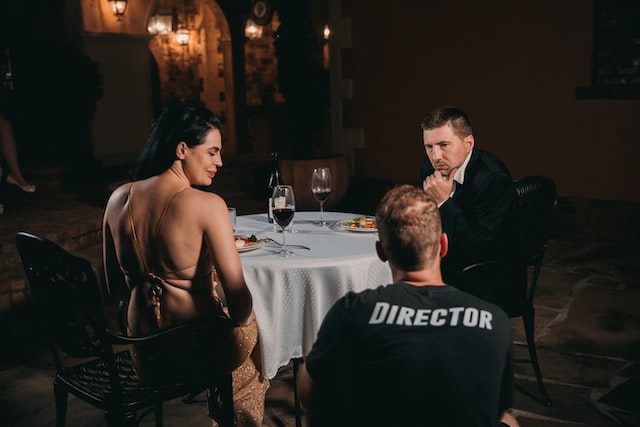Let’s talk about sex.
Expressions of intimacy are a big part of how actors communicate love and lust on screens. Whether it’s conveyed through holding hands or making out, performers have been simulating human connection in the name of art for years. However, a lot of it isn’t very accurate or comfortable for actors to film.
The discomfort actors experienced on set often slid under the radar, until it came to a tipping point and many of them collectively decided they’d had enough. The #MeToo discourse was a wake-up call for the industry as it became apparent that countless incidents of inappropriate behaviours, such as sexual harassment and assault, were taking place on set.
For many, the film industry became a dark and toxic place, from rumours of the horrendous “casting couch” to issues surrounding consent in intimate scenes. In the wake of the #MeToo movement, a damning survey released by the Media and Entertainment Arts Alliance (MEAA) found that 40-50% of respondents had experienced sexual harassment or assault on set or on stage.
So what was the industry’s solution?
Intimacy coordination and guidelines.
The Intimacy Coordinator was once a rarity in films. In fact, most sets didn’t have the proper support or guidelines to make intimate scenes.
Variety Australia spoke to one actress (who spoke on the condition of anonymity) about her experiences on set. She spoke about two horrible incidents; the first was when a director kissed her during a blocking rehearsal, and the second was when she’d been asked to show more of herself during a scene than she felt comfortable with.
“I was pushed to do things I didn’t want to do,” she told Variety Australia.
“They wanted me to show more of myself than I felt comfortable with, and now I fear I’m on some Pornhub site or something like that.
“I was asked to show my boobs, and there were stills taken of me during that time. [During] a shower scene, I was asked to take my underwear off, and I said no because it’s a mid-shot and it’s out of frame. It was the polar opposite to my experience with … the intimacy coordinator,” she says.
Intimacy coordinator and acting coach Rebecca Fortuna, and SAG-AFTRA accredited intimacy coordinator Michela Carattini, told Variety Australia that an intimacy coordinator is responsible for many things on set, such as ensuring actors feel comfortable and safe, and at times they can have additional expertise or qualities that may be beneficial to your project.
“The main thing this role is bringing to sets, which has been missing for a long time, is just the open communication about intimacy and how it’s not something to be feared,” Fortuna says.
Aside from ensuring consent, intimacy coordinators play a huge role in the disruption of power dynamics on set and can conduct a risk assessment for certain scenes. They try their best to ensure actors never feel the pressure that they could be replaced by not consenting to perform intimate actions on set.
“Intimacy coordinators speak one-on-one with the actors involved in the scene to interrupt the producer/director/actor power dynamic,” explains Carattini.
“It’s to provide a safe space with a person who doesn’t have the power to hire or fire that actor and who is there to advocate for the actor and to help come up with ideas and alternatives that are going to be within the actor’s boundaries but also serve the vision that the director has.”
The #MeToo movement was a monumental milestone that helped create demand for intimacy coordinators and guidelines around filming sex scenes safely. Carattini pointed to the findings of the 2015-2017 forums run by Women In Theatre and Screen (WITS Australia), where she sat as one of the committee members. She said the #MeToo movement brought a lot of attention to this issue in the Australian industry, but even before then, they had heard incredible testimonies of some of the issues people identifying as women would face on sets.
One woman who attended the forum said, “I was bitten and bruised by a male actor in a fight scene in which my character was raped. I had ribs broken. And when I spoke up, I wasn’t heard. I know of other women who felt threatened to play vulnerable roles, but they’re afraid to speak up.”
This behaviour, and thousands of other testimonies that were heard, highlights how big the problem is. But there is a shift, with more intimacy coordinators popping up in Australian projects. In addition to the inclusion of intimacy coordination, Australia now has a brand new set of guidelines released by the MEAA. Intimacy coordinators are slowly becoming more present on sets, but for the safety of everyone, there is a push to make them mandatory.
There’s a big difference in the impact they can make on sets. The actress who spoke to Variety Australia under anonymity had this to say about her experiences with an intimacy coordinator: “All my concerns had been taken care of, and I could focus on my work and not feel judged or embarrassed when that scene comes out.”
She added: “I think intimacy coordinators should be made mandatory because it allows the actor and director to focus on the million other things they need to focus on. The coordinator is there to facilitate the actor to do their job.”































